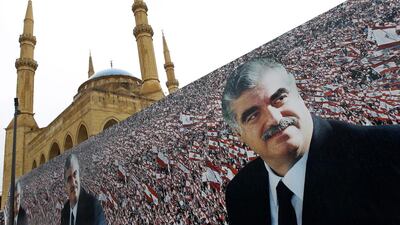An event that occurred last weekend may not have been high in the attentions of most Lebanese, but still had some meaning in a region reeling from violence and intolerance.
On Sunday, elections were held for the leadership of the National Council of March 14, a coalition of political forces formed in the aftermath of former Lebanese prime minister Rafik Hariri’s assassination in 2005. The election was won by Samir Franjieh, a well-known political activist who hails from a prominent north Lebanese Maronite family and who was active in the Muslim-Christian dialogue during the 1990s.
March 14 announced the establishment of a National Council last March, its aim being to develop a new political platform. This decision was implicit recognition that the coalition needed to revitalise itself after years of decline and marginalisation.
Elections were also held for a 14-member bureau and 14 specialised committees. Within three months an executive office is to be elected. But beyond the organisational details, the attempt to breathe new life into March 14 also represents an effort to transcend politics. The coalition’s history provides insights into why that is the case.
March 14 was named for a massive demonstration held in central Beirut on that date in 2005. It came on the one-month anniversary of Hariri’s murder and only days after a large Hizbollah rally in favour of Syria, which was believed to have been behind the former prime minister’s killing. Estimates put the number of participants at around one million.
This was the culmination of a month-long series of popular gatherings and events at Martyrs Square, mainly to demand a Syrian withdrawal from Lebanon, the government’s resignation, and removal of security and judicial officials who had harassed Hariri. The spontaneity of the demonstrations created a sense that March 14 was more a product of Lebanese civil society, outraged by Hariri’s fate, than of political parties.
Whatever the accuracy of the sentiment, what emerged from all this was a feeling that March 14 reflected a deeper set of ideals and impulses transcending organised politics. Among the most powerful was Lebanese unity after the Hariri assassination. Not only were the Lebanese united, they were united in defence of liberal values and the rule of law against a criminal pro-Syrian order defended by a “Syrian-Lebanese security apparatus”.
The sense among March 14 partisans later was that once the politicians hijacked their popular movement, it was only a matter of time before political divisions would ensue. March 14 adopted a formal structure by establishing a general secretariat. This body, lost amid the contending agendas of the parties making up March 14, exemplified political irrelevance to many.
During that time March 14 lost much ground. The final nail in the coffin came in 2011, when Saad Hariri, the son of Rafik, himself a former prime minister and a driving force behind March 14, left Lebanon, fearing assassination. This left only the general secretariat in place, releasing statements nobody read.
Mr Franjieh, along with his close partner Fares Souaid, the coordinator of the general secretariat of March 14, now hopes to reverse this. Their desire to go back to the original principles of March 14 is astute. Not only does it play off the coalition’s one-time appeal to civil society, it also adapts to the growing disgust in Lebanon with the political class, and seeks to uphold national unity at a time of deep rifts in the region.
Mr Franjieh said that preparations were being made for an “intifada of peace” and the establishment of a civil framework allowing the state to overcome confessional and sectarian polarisation. He also vowed to work with “forces of moderation and democracy in the Arab world that oppose extremism”.
This may have sounded naïve, but the message will appeal to the March 14 faithful precisely because it contrasts with the sterile political discourse prevailing in the country today.
If one judges the initiative to resuscitate March 14 by common political benchmarks of success – popular representation, portfolios in government, and so on – disappointment is ensured. Rather, the success or failure of the venture will be determined by March 14’s ability to shape political interactions by pushing issues that have resonance among the Lebanese.
That will not be easy. The Lebanese today, it seems, have switched off to politics. Nor does the country seem to be in a mood to embrace the temperance and openness voiced by Mr Franjieh. To many Lebanese, March 14 is just another mediocre manifestation of a wider problem, that of a country riven by political bickering and the petty ambitions of its leaders.
But if Mr Franjieh and his comrades can offer ideas that help advance national unity, reconcile the sects, and enhance Lebanese democracy and popular participation, they may make headway. The ambition to return politics to where it should be, namely the people, may have some life in it yet.
Michael Young is opinion editor of The Daily Star newspaper in Beirut
On Twitter: @BeirutCalling


